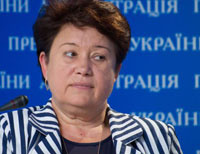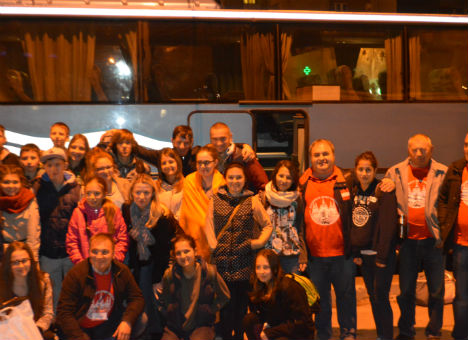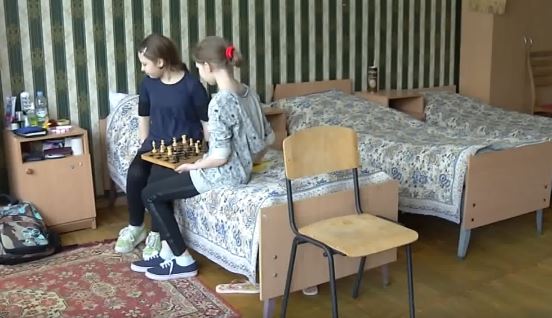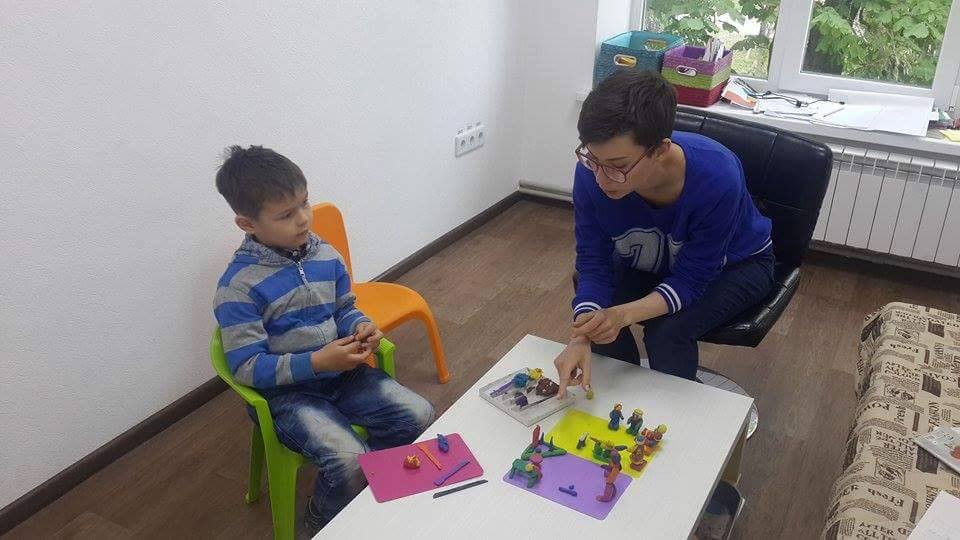Officials at all levels and of all generations often repeat their favorite mantra that children are the future of Ukraine. Meanwhile, hundreds of children are losing their parents; hundreds of our orphans are becoming pawns of the Kremlin's false propaganda and are experiencing personal trauma and tragedy. Hundreds are living without documents, with no legal status, with an uncertain future. Dzerkalo Tyzhnia discussed these matters with Liudmyla Volynets, head of the Office of the President's Ombudsman for Children.
 Ms. Volynets, war always goes hand in hand with the orphaning of children. What core problems have worsened for children in Ukraine since the beginning of the fighting? What solutions do you see?
Ms. Volynets, war always goes hand in hand with the orphaning of children. What core problems have worsened for children in Ukraine since the beginning of the fighting? What solutions do you see?
There is no child in Ukraine that has not been affected by the war. There are children who had been in the ATO (Anti-Terrorist Operation) zone and have left it. They have experienced the tragedy of war, the loss of their home, and adaptation to a new place. There are children who are still in the ATO zone. There are children whose parents have not returned from the ATO zone. And there are children terrified that their father will go there tomorrow. There are children who live in affluent Odesa, Kherson, Mykolayiv, but who feel threatened. This is why, without exception, all 8 million Ukrainian children have suffered from the hostilities or, more accurately, from Russia's undeclared war with Ukraine. And each child in its own way will be marked for life by the war.
We already have children whose birth certificate carries the seal of the so-called DNR (Donetsk People's Republic) or LNR (Luhansk People's Republic). What state do these children belong to? Who is responsible for them? Of course, the representatives of the terrorists are not well-informed on how a state certifies the birth of a child. And, by the way, this is not always done according to the will of the parents.
We now see children with uncertain status. Due to the complex processes involving police in the ATO zone, we do not have officials who can confirm cases of child abandonment and cases where mothers refuse their newborns. In certain areas, there are no officials who can sign documents on behalf of the state that would allow the child to be adopted or brought into a family.
The basic conditions for child homelessness are growing. In the Donetsk and Luhansk oblasts 50% of state and municipal institutions for the care and guardianship of minors are not working. Therefore, officials are not able to fully carry out their responsibilities.
So now we see children who instead of their mother's death certificate have a photo of her grave. With this kind of "document" the child cannot enter the state protection system. And this means the child risks homelessness.
Among the many difficult life circumstances of the families in the Donetsk and Luhansk oblasts, which often lead to child abandonment, there is now another one that outweighs all the others -- loss of housing. And for displaced persons, this is followed by loss of the social environment, the support of loved ones.
A recent meeting with volunteer organizations and the heads of services for children has determined that by far not all of the internally displaced persons have been able to cope with the stress. Some of them have become dangerous for their children because they have increased their alcohol dependence and so forth. Today they need psychological help, but if they do not respond to it, then obviously it is necessary to save the child. The issue is not an immediate termination of parental rights, but at least the removal of the child from the family. However, according to law, the termination of parental rights or the removal of the child without that termination occurs at the place of residence and registration of the person.
For example, in order to remove a child from a family that has moved from Alchevsk to the Zaporizhzhia Oblast you need a decision by the local court from the child's hometown. But this court is not functioning. During peace, this procedure was entirely justified, but today it is actually making the termination of parental rights or the removal of the child impossible. Thus, sometimes unfounded decisions are made to place children without the status of orphans in residential institutions. Parents are actually persuaded to place their children in the boarding institutions.
This is why, once the orphanages reach 100% capacity, we will see the worst manifestation of homelessness. Because its main source (45%) are children who run away from orphanages. Unfortunately, today on the streets of Kyiv we're already seeing children with glue, plastic bags, with everything that Ukrainians have forgotten since 2009.
Last week I met with child welfare services in 20 oblasts in Ukraine (out of 800). We attempted to figure out how to reduce confusion in the state's civil service. After all, we still do not have any regulatory document that defines evacuation and displacement or explains how to remove parental rights when these citizens are displaced persons or what to do with foster families or family homes arriving from the Donbas.
It turns out that we need to apply the current legal framework but view it through the perspective of the new situation, something civil servants often neglect to do. We found answers to most of the questions that have been keeping the services from being effective. ATO and relocation are very good reasons to review a decree which regulates the sequence of actions by welfare and guardianship agencies. I want to take this opportunity to appeal to the heads of the regional administrations and the city mayors: Every orphaned child that ends up on your territory (for a week or possibly even for the coming years) falls within your area of responsibility, even if it was not born on your territory, even if it was not orphaned on your territory. Do not look for the word "evacuated" in the law; look for the key word "child-orphan," deprived of parental care at the place where it is currently staying.
Mayors are elected positions, but there are also state executive bodies. There is much talk now of government lustration. How, in your view, can this be done to avoid dismissing people indiscriminately but to strengthen the work on the question of orphans?
People guilty of crimes or who don't want to work should be dismissed. We recently experienced public euphoria over the fact that the auto fleets of civil servants would be reduced. I support this when it comes to bureaucrats. But, for example, last week the staff of one of the services for children pitched in 20 hryvnias each for gas to take an orphaned child 60 km to the center for social and psychological rehabilitation. Today we reduce the fleets, tomorrow we will dismiss the employees who do not visit the families, forgetting that they are not visiting them because there are no cars or no gas. The question is not who is being dismissed, but who will be working tomorrow.
Before the beginning of hostilities, all the statistics in the country were taken at the place of origin of the orphaned child. Today in two occupied territories in Ukraine -- Crimea and Sevastopol -- information on children is completely unavailable. And in the Donetsk and Luhansk oblasts, where local governments are not functioning, this information is not recorded. Therefore, we must change the methods of gathering statistical information on orphans. Unfortunately, I don't see any willingness at the Ministry of Social Policy. But if we do not know how many orphans we have, we will not be able to establish any kind of budgetary process next year.
How has the war changed the adoption of orphans or their placement into family care?
Adoptions are taking place. According to my information, for example, of the 60 children that the terrorists attempted to take to Russia and who were returned and taken to the Kharkiv Children's Home, eight have already been adopted -- four of them by residents of the Donetsk Oblast. The amount of compassion among Ukrainian people is greater than it seems.
Naturally, the number of adoptions is decreasing. War always means instability and, naturally, under those conditions families find it ten times harder to make decisions about adoption. The more responsible the parents are, the harder it is. But I know that in the Kharkiv Oblast, for example, there is a waiting list for the adoption of children from Luhansk. It is true that only a third of them are available for adoption and two-thirds can be brought up in a foster family or a family home.
Sometimes we hear demands to simplify the adoption process. I am strongly against that. Adoption is a complex mechanism. The process begins not when the adopting parent is found, but when the child loses its parents. And we must ascertain that the child really has lost its parents, that these parents cannot be rehabilitated or located. This is a very difficult process. And if today, God forbid, politicians insist on simplifying the adoption procedure, then we cannot exclude cases where the father is at the front and his child has already been adopted. In connection with the military operations in Ukraine, the circumstances for the child's loss of parental care have changed. People are disappearing without a trace, we have the unidentified dead. But there needs to be a document certifying that there is no father.
Social tensions, insecurity about the next day, persistent rumors that everything will be more expensive tomorrow and so on, will continue to keep responsible potential adopters from the decision to adopt, especially if they are not familiar with the child.
According to the Ministry of Social Policy, in 8 months of this year we had 1,025 adoptions. We are forecasting 1,500 adoptions by Ukrainian citizens by the end of the year. Last year we had 1,831 adoptions. The international adoptions are falling as well. In the Donetsk and Luhansk oblasts this process has been stopped altogether in April so as not to endanger foreign adopters. Already 370 adoptions have taken place. But there is yet another problem. In the Donetsk and Luhansk oblasts there is no regional database of children available for adoption. This means that children from these territories do not end up in a centralized database -- they are not "seen" by adoptive parents from other oblasts.
By the way, the process of adoption, the very existence of international adoption, has become part of Russia's information war against Ukraine.
As for foster families and family homes, the trend is not very optimistic. During the past six months, 856 children were accommodated. We expect to place 1,700 children by the end of the year. For comparison, last year we had placed 2,400. The local governments are seriously behind in their work. And during war conditions, the issue of orphans should double the motivation.
Do we know how many children have been orphaned by the war?
We don’t have that statistic and won't have it as long as we have the unidentified dead and situations where children have a photo of their mother's grave instead of a death certificate -- until we can prepare legal documents for the child. Given the horrific treatment of the civilian population by the militants, as we know from accounts, I think it will take a long time to obtain this statistical information.
What are the trends today on child abandonment? Do you see an increase or decrease of "orphans" with living parents. And what are the reasons in your view?
Today there are certain circumstances that increase biological orphanhood. War, unfortunately, is continuing. Adults are dying, so children often find themselves with just one parent. People that have committed crimes against people will be brought to justice. Some parents end up in jail. Very many people are disabled, and many people cannot perform parental functions because of illness. In some cases the disability will lead to death. These, unfortunately, are absolutely foreseeable facts. When I meet with government officials, I constantly warn them against false statistics regarding the number of orphans and children whose parents have lost their parental rights. Certain regions are already trying to argue that the numbers of orphans is not rising in their area. This is very dangerous. After all, when the child acquires the status of orphan, this means state protection. Otherwise, we have unmanaged child homelessness, and later youth homelessness and children being born in the street. Thus we will be bringing back all that was going on in difficult and long forgotten times.
The government has been unable to protect orphaned children in time and attempts have been made (sometimes successfully) to take them out of the country to Russia. Why?
The children have been removed from Ukraine not because of Russia's desire to help in any way, but for political reasons -- to show representatives of international (monitoring) organizations that the Russian Federation is protecting Ukrainian children. This has been planned since 2011. At that time Ukraine was recognized as having the best system of protection of children's rights among post-Soviet countries. Plans to present Ukraine's experience in a negative light had been worked out long before April-May when the unrest began in the Donbas. The Russians claim that Ukrainians, unlike Russians, are supposedly selling their children for body organs and that (Russians) have to protect Ukrainian children from physical death.
Russia did not expect that all of Ukraine would rise up and demand the return of the children abducted by the militants from the Snizhne boarding school. And that on June 13, Ukraine would accuse Russia of the international abduction of children at the European Court of Human Rights.
Recently I met with a large delegation from the Russian Federation during an international conference. In private conversations they said that Ukrainian children are swelling the army of homeless children in Russia. This is very worrisome for us. They also said that in a year they will return our children because they will no longer be politically expedient.
It is known that the Russian human rights activist Elena Vasylieva is collecting data on the Ukrainian orphans taken to Russia in order to file a complaint with the Hague court. Are they doing this in Ukraine? Why are Ukrainian human rights activists silent about this?
Ukraine has filed a lawsuit in the European Court. When it comes to the Hague Tribunal, it will suffice. However, there is another issue. I don't know what situations Ms. Vasylieva is familiar with exactly and to what extent she understands the specifics of Ukrainian law and the intricacies of obtaining the status of orphan for a child, the rules on crossing the border and the like.
Today the guardianship agencies are receiving various requests from Russia. One example: a little boy has arrived with his grandmother from the Luhansk Oblast while his parents have remained there and the request is to remove their parental rights. This is absurd. Another example: an orphan with his guardian has crossed the Russian border, therefore send us the personal file of the child. A guardian with his ward has the right to cross the border and go to Russia. However, he is obligated to return and inform the guardianship authority about where the child is staying. The monthly benefit of more than UAH 2,000 for support of the child can be received only in Ukraine. These two cases are not examples of international abduction.
During the last six months volunteer organizations have often taken the place of the government agencies, performing their functions, especially in the area of child protection. Do you think it would be worthwhile to have volunteers replace the ineffective bureaucrats?
Let us make sure that both are working as effectively as possible for the benefit of the children.
Does Ukraine need an ombudsman for children? If so, what should be the requirements of the job?
If these answers did not already exist in numerous international and national documents I would discuss this now. However, there are clear requirements. Ukraine needs to have an authorized person responsible for children's rights since it has ratified the UN Convention on the Rights of the Child, the protocols on the involvement of children in armed conflict and on combating child pornography, as well as the Convention on the Adoption of Children and the Convention on International Child Abduction. In Ukraine, the Verkhovna Rada has made a number of attempts to create such a position. However, neither the previous nor the present Parliamentary commissioner for human rights supported this idea, arguing that they were performing this function well themselves. And if a commissioner for children's rights were needed, then why not a commissioner for retirees, for miners, etc. I believe these discussions are unprofessional since children in any country represent a group in society that does not have the rights of protection of its own interests. It is always an adult that protects the interest of the child, and the quality of that protection determines whether the child is placed at risk. The post of a children's ombudsman has been established in 84 countries.





